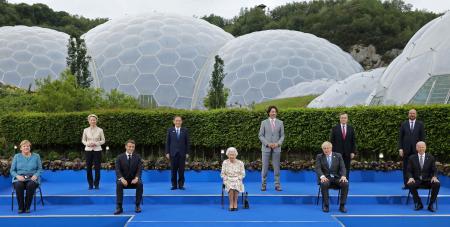
- ARAB NEWS
- 02 Jul 2025

CORNWALL (England): Leaders of the Group of Seven key industrialized nations agreed Saturday to launch a massive infrastructure investment initiative for the developing world to rival China’s “Belt and Road” program.
The Build Back Better World initiative, worked out on the second day of talks at the three-day G-7 summit in Britain, is designed as part of the united effort by Japan, North America and Europe to tackle China’s increasingly hegemonic behavior.
According to the US government, the initiative, on a scale of hundreds of billions of dollars in the coming years, calls for intensive investment in four areas of focus — climate, health and health security, digital technology, and gender equity and equality.
China has provided large-scale financial assistance to developing countries, mainly in Africa, to help infrastructure development projects, but the projects have caused a series of problems, such as environmental destruction and excessive loans.
The G-7 countries plan to support high-quality infrastructure development in developing countries.
One of the biggest themes at the G-7 summit in a seaside resort in Cornwall, southwestern England, is how to face China, which has become a major military and economic power and come to pose a threat even in Europe.
US President Joe Biden has called on his G-7 colleagues to display the power of democracy to deter threats in the new era.
The new investment initiative is part of his strategy to counter China and Russia, which the G-7 democracies see as autocracies.
China has been posing a growing military threat near the Japanese-administered Senkaku Islands in the East China Sea, which it claims as its own, and the Taiwan Strait.
At the second-day summit talks, Japanese Prime Minister Yoshihide Suga expressed “deep concerns” over China’s unilateral attempts to change the status quo in the East China Sea and the South China Sea and Beijing’s human rights record in Hong Kong and the Xinjiang Uighur autonomous region, saying they are in conflict with the values honored by the G-7 club.
The G-7 nations should act in collaboration on these issues, Suga said.
It will be closely watched whether the leaders’ declaration, to be adopted on the third and last day of the G-7 summit on Sunday, will clarify the participants’ commitment to the importance of peace and stability across the Taiwan Strait.
The G-7 leaders are believed to have exchanged views on Taiwan.
The G-7 summit, held in person for the first time in two years, brought together leaders from Britain, Canada, France, Germany, Italy, Japan and the United States, as well as the European Union.
Regarding North Korea, Suga said Japan firmly maintains its goal of achieving the complete, verifiable and irreversible abolition of the reclusive country’s nuclear and missile programs.
Suga also called for cooperation from other G-7 countries in Japan’s efforts toward an early solution to the issue of Japanese nationals abducted by North Korean agents decades ago, which he called the most important challenge for his administration. Other leaders expressed support.
The G-7 leaders denounced the military coup in Myanmar as unacceptable.
Also on Saturday, the G-7 leaders discussed the distribution of novel coronavirus vaccines to developing nations.
The British government, the host of the G-7 summit, has revealed that the leaders are expected to agree to provide the world with at least one billion doses of COVID-19 vaccines by the end of 2022.
JIJI Press